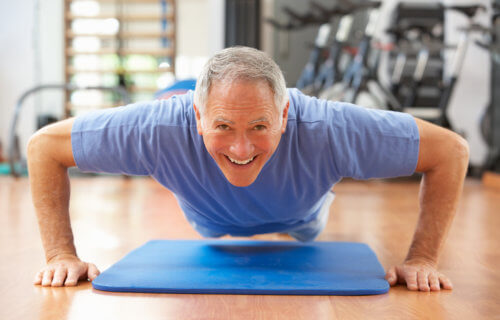FAYETTEVILLE, Ark. — Exercise helps keep us young, and new research finds that statement is more literal than most assume. Scientists at the University of Arkansas report exercising slows down the aging process on a cellular level. The effect remains even if you start exercising later in life.
The team’s animal study used elderly lab mice nearing the end of their natural lifespan (22 months) and studied their interactions with a weighted exercise wheel. Mice rarely need any motivation to go for a run. Older mice run about three to five miles per day and younger mice run six to seven miles daily. The extra weight on the wheel also ensured the rodents’ muscles got an extra workout, with researchers comparing the workout to “a soldier carrying a heavy backpack many miles.”
After two months on the weighted wheel, mice were similar to those eight weeks younger compared to mice of the same age (24 months) who hadn’t worked out.
“Historically, they start dropping off after 24 months at a significant rate,” says Kevin Murach, an assistant professor in the Department of Health, Human Performance and Recreation at the U of A, in a university release. In other words, an extra eight weeks of youth represents roughly 10 percent of the average mouse’s lifespan.
Exercise slows down the aging process in your DNA
Much of the science behind these findings is based on DNA methylation. Methylation is when little caps called methyl groups attach to DNA. They act as a key to turn on and off a specific gene. As the human body ages, DNA methylation increases. Some older adults even experience hypermethylation on muscle genes.
“DNA methylation changes in a lifespan tend to happen in a somewhat systematic fashion,” Prof. Murach explains, “to the point you can look at someone’s DNA from a given tissue sample and with a fair degree of accuracy predict their chronological age.”
While the association between methylation and aging is quite clear, researchers know less about the role of methylation in muscle function. For example, it’s too soon to say that exercising and reversing methylation improves muscle health. “That’s not what the study was set up to do,” Professor Murach comments. However, he intends to pursue future studies to determine if “changes in methylation result in altered muscle function.”
“If so, what are the consequences of this?” Professor Murach concludes. “Do changes on these very specific methylation sites have an actual phenotype that emerges from that? Is it what’s causing aging or is it just associated with it? Is it just something that happens in concert with a variety of other things that are happening during the aging process? So that’s what we don’t know.”
The study is published in Aging Cell.
